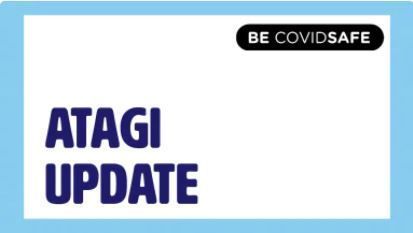
Recommendations
Given the likelihood of ongoing transmission of both Omicron and Delta variants, ATAGI recommends COVID-19 booster vaccination for anyone aged 18 and older who completed their primary course of COVID-19 vaccination 5 or more months ago.
Timely receipt of a booster dose is particularly important for people with increased exposure risk (e.g. occupational risk or outbreak areas) or who have risk factors for severe disease.
Either Comirnaty (Pfizer) or Spikevax (Moderna) are recommended for use as a booster vaccine, and are considered equally acceptable.
ATAGI reiterates that a third (primary) dose of COVID-19 vaccine is also recommended for anyone with immunocompromising conditions, a minimum of two months after their second dose.
Background
ATAGI are closely examining all data on the epidemiology of COVID-19 and COVID-19 vaccine impact, in particular emerging data on the new Omicron SARS-CoV-2 variant.
On 28 October 2021, ATAGI recommended boosters for all Australians aged 18 and older from 6 months after their primary course, or from 5 months in specific circumstances. ATAGI now advises a routine interval of 5 months.
Omicron was first reported in South Africa on 24 November 2021. The World Health Organization (WHO) declared Omicron to be a SARS-CoV-2 variant of concern on 26 November 2021 and it has since been detected in over 50 countries globally. Cases of COVID-19 due to Omicron, including some acquired in Australia, have been identified in multiple Australian jurisdictions.
Evidence is still incomplete on the transmissibility, capacity to cause severe disease and overall impact of the Omicron variant. While data suggest that past infection with an earlier variant does not provide significant protection against infection, it remains unclear whether prior infection may reduce severity.1 Early data suggest that the protection provided by COVID-19 vaccination against infections with the Omicron variant is impaired compared to those with the Delta variant, but further data are required on the effectiveness against severe disease.
The virus has been isolated in several laboratories, including those in Australia, and laboratory, clinical and epidemiological studies are underway globally and in Australia to understand its potential impact. Preliminary data suggest that the increased antibody levels generated following a COVID-19 vaccine booster dose may offer improved protection against the Omicron variant. However, the correlation between antibody levels in laboratory studies and protection against infection and severe disease is not yet established.
Rationale
As of the 11 December 2021, the weight of evidence suggests that a booster vaccine increases antibody levels substantially and this will likely offer protection against both Delta and the new Omicron variant. However, there is limited evidence to inform the optimal interval between primary and booster doses. Although registered for use from 6 months after primary vaccination, there are considerable data on the effectiveness and safety of boosters from 5 months from the Israeli program.2,3
The anticipated benefits of bringing forward the booster dose include earlier protection, particularly against severe disease in those at risk, and improved protection against COVID-19 due to the Omicron variant. The relative benefit of a booster vaccination increases with the duration since primary COVID-19 vaccine course and for those living in regions with community transmission of SARS-CoV-2. There remains uncertainty about the duration of protection following a booster dose, and the potential emergence of future new variants.
Vaccine manufacturers have also signalled they are examining the need for and potential development of COVID-19 vaccines that may be more effective against new variants, however this is expected to take several months.








